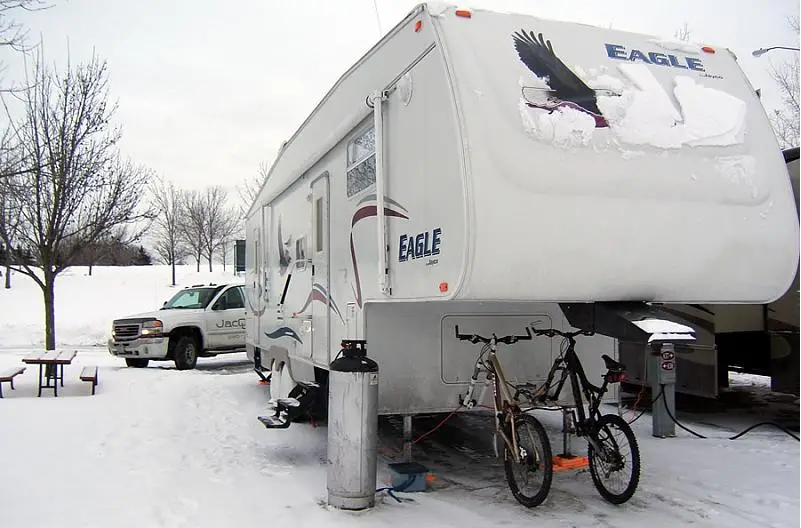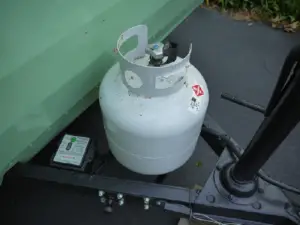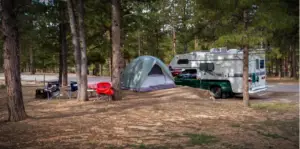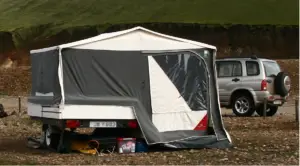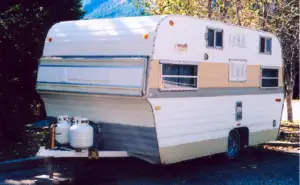Your RV is a reliable companion all through the summer, traveling miles after miles without stopping for a break.
The least you can do in return is giving your RV a comfortable setup for winter hibernation. Taking your time to prepare your RV before storing it for the winter is crucial for your investment’s long-term protection.
Here are tips on what you should remove and what you should leave in your RV over the winter storage to ensure your RV is ready to go camping again come spring.
Drain the water lines and tanks: Your plumbing system need to be cared for a lot during winter. Before putting the RV for storage make sure all the pipelines are drained completely. Drain all the tanks as well. Fresh water tank, both holding tanks should be drained completely before winter storage. If your camper uses an inline filter then make sure it is removed as well.
Remove the batteries : Its always best to disconnect and store the batteries separately while the RV is in storage. Winter can weaken the batteries and therefore store them in proper warm base and avoid cold concrete. DC batteries used in RV can also drain by themselves even when they are not connected. Therefore, check their charge every few weeks and recharge if it has dropped below 80% charge. Do not allow the charge to drop down to 45% in any case.
Remove food from refrigerator : Keeping food of any sort inside the refrigerator when its not connected to supply will obviously lead to odor and mold inside the fridge. This is no brainer and should be followed strictly. In case if the refrigerator will remain connected then too its better to remove all the food items. Clean and clear the fridge fully before putting for storage. Keeping the door open will additional make sure that the refrigerator does not smell.
Disconnect propane : Make sure all the propane lines are disconnected and appliances do not receive any propane at all. Check for any leaks on propane and also make sure that there is no propane onboard.
Fill the tanks with Antifreeze : In case you will be in sub zero or minus degree temperature area then make sure to run the tanks through antifreeze. When the temperature falls below freezing point, the plumbing system in your RV can freeze. Antifreeze can prevent this from happening. Normally, propylene glycol antifreeze is used in RVs that is non toxic and non flammable.
Jack your RV : Since the RV is going to stay in storage for months, its best to jack the tires and relieve them from all the weight. If the RV is going to be parked on concrete base then make sure you are using some sort of mat to keep it free from moisture. Different RV parking pads can be used to keep tires from weakening during the storage.
Fuel stabilizer : In case of motorhomes, make sure you are adding fuel stabilizer before putting it in storage. Add enough fuel and run the engine, this will make sure fuel is circulated properly. Running the engine once every few weeks will keep it in good condition.
Find a safe location
Preparing your RV for winter storage has multiple things to do like winterizing the RV, removing things like battery etc but the most important part is to decide what type of storage to use.
If possible, you can park your RV for the winter under a roof or in a shelter. However, for some RV owners, this is not possible.
If that is your case and you are planning to store your RV in your yard or driveway, try finding a sheltered location from the wind and park it out of the way of any trees that might come down in an ice storm or a wind.
For instance, you can consider parking your RV behind a sealed fence or in another outside storage unit.
If you don’t have a safe space or room to park your RV and give it the security it deserves, you can try to rent space from someone in your vicinity.
You have multiple options for putting RV in storage during winter. Below are your options :
Indoor storage
This is the expensive one where in your RV will remain more secure from things like rain, hurricane, snow storm, heat and all the other environment impacts. This is the most secure way but it is also the most expensive one.
You get indoor heated storages that can be as costly as $110 to $400 per month based on your location and how harsh the weather is in that region. For non heated indoor storage, the cost per month can be between $50 to $150 per month.
It makes sense to go for such costly storage only when you own a costly motorhome or fifth wheel and will be using it for years.
Covered storage
This type of storage is less costly and it will protect the RV from direct rain or snow. Though, your RV will have protecting shelter on top, the external weather factors will affect the RV with time or if the weather is too harsh.
Check this detailed guide on why you should get covered storage for your RV.
Outdoor storage
This type of storage facilities do not protect the RV from direct rain or snow but will provide parking space for long term storage.
A lot of people choose this type of option when the weather isn’t bad and they do not have parking space of their own. People do park RV’s in front of their home but this may not be allowed in some locations.
Own RV garage or Home Storage
Having a garage of your own for your RV is the best but it takes a lot of space and the cost of building will also be high. If you do have that big garage then it will the best for your RV.
Check here normal garage dimension for different type of RV’s.
Wash it properly
Let’s be honest; after the various road trips in the camping period, your motorhome is somewhere on the scale between dirty and filthy. Before you do anything else, you should give your RV a thorough cleaning.
Prepare your RV for winter storage by using clean and mild soap water to take care of their exterior, but the interior will require more work.
You need to protect the interior of your RV from sun exposure, unpleasant odors, and mildew.
- To protect from mildew, ensure you clean and remove all perishables.
- To prevent sun exposure, close all curtains, blinds, and windows.
- Cleaning and draining the water tanks can also help to eliminate the indoor RV.
- When doing your interior inspection and cleaning, do not forget about drawers, cupboards, and closets.
After cleaning, leave the RV’s interiors dry to guard against mold.
Should You Cover The RV For Winter?
Absolutely yes! This is one of the items you cannot overlook, particularly for outdoor storage.
- If your RV will be outside all winter, it is recommendable to invest in a cover made particularly for an RV.
- The cover will protect the RV against extended exposure to ultraviolet rays that might damage the paint finish.
- It will also protect it from tree sap, wind damage, and bird droppings.
- However, you should not use a plastic cover as it traps humidity between it and the RV. The plastic cover can also flap around in the wind, damaging exterior surfaces.
- Instead, you should get coverage that is specifically designed for your RV and your climate.
The covers have straps that help keep your RV wrapped uptight, as well as zippered openings to allow you into your RV if you need to. Secure your cover tightly, and do not forget to cover even the wheels.
If your camper has vent covers then keeping them cracked open will allow some air circulation inside the RV during indoor storage.
Completely drain the water system
This is one of the most crucial steps for winterizing your RV, remnant water in the plumbing system freezes and may damage fittings and lines. This damage will be expensive to repair.
You can winterize your RV yourself considering the complexity of its plumbing system.
- The process involves draining the fresh water and the wastewater tanks.
- You should drain all the water out of the pipes and pump nontoxic RV antifreeze through the whole water system.
- The antifreeze pushes the water out of your plumbing system.
Your RV’s manual should also include a checklist for draining the water system.
Nevertheless, if you don’t feel competent to do it yourself or don’t want to invest the time, a trained professional at a reliable service center can offer this service for a fee.
Should the fridge be on or off in winter storage?
A fridge is not meant to operate when the air outside is colder than the air inside it.
Cold temperatures on the outside can even cause the compressor oil to get very thick, affecting its circulation, which might burn out the compressor.
If you don’t mind keeping your RV plugged in during winter, you can leave the fridge on. If that is not the case, you should empty the fridge, unplug it and clean it thoroughly and it will just be fine.
Make sure you turn off all the LP operated appliances and cut off the propane supply.
Empty the medicine cabinets and cupboards
When it is time for winter, it is vital to get all liquid and food items out of the RV. This includes; shaving cream, toothpaste, hand soaps, and such. This bathroom stuff can freeze and crack in the winter, causing a mess when they melt during the spring.
Get rid of all the liquids and food that can ruin your cupboards and cabinets. While paper towels, rags, and tissue are not perishables, they help make animal nests. Take them out and use them in the house instead of giving critters a reason to feel coy.
Should the battery be removed during storage?
Winter temperatures are harmful to RV batteries. You should hence disconnect the batteries and store them in a cool and dry place.
Batteries tend to lose some of their storage charges, and storing the batteries at a cool temperature will slow that loss. Freezing a battery repeatedly or continuously over the entire winter is a perfect way of shortening its life.
To prevent this, the safest option is taking out your RV’s batteries and putting them into storage somewhere cool and dry in the house.
Check the charge after approximately every four weeks with a voltmeter and charge the batteries as needed to keep them wholly charged and ensure they don’t die.
This is important because a partially charged battery might freeze faster than a completely charged one. If the batteries are low on water, fill them up with distilled water. Once the winter season is gone, you can connect them right back into their place in the truck.
Should you jack up your RV?
To prevent tires from damaging in the course of storage period, you should keep the tires inflated to the pressure level endorsed by the constructor.
- You should also cover the tires to avoid prolonged sunlight exposure.
- Give them a thorough soapy wash to eliminate the build-up they have acquired on the road.
However, sitting in one place for months can make flat spots on the tires. If the tires get flat spots, you will be forced to replace them in the spring.
To prevent this, use jacks and blocks to keep the pressure off your tires to not rest directly on the tires.
This will also help to avert a costly replacement. Alternatively, you can drive your RV out once per month to ensure the tires do not damage from pressure damage.
Remove all the food from the RV
Another essential thing to do to maintain your RV in good shape is to make it critter-resistant. Squirrels and mice enjoy making their winter home in an RV where they might chew the wiring system, rubber, and plastic components.
- To discourage the rodents from infesting the RV, remove all food from the RV and thoroughly clean the refrigerator, cupboards, freezer, floors, and countertops.
- Removing all perishables from the truck also prevents mildews from growing and destroying the interior.
- Also, consider placing ant and mouse traps in and around your RV with particular attention to where rodents can get in. An RV service provider can examine your RV’s underside and cover any cracks and holes.
It is not recommendable to put mice killer in the RV as you might have kids living or playing around. If it effectively works, having a dead rat decomposing in your RV in the winter is not fun.
Check under the RV for any small holes or opening and seal them with a silicone or foam. Mice or rodents can enter through even the smallest openings and therefor do a thorough check.
Keep the closets and cabinets open.
Another maintenance tip for your RV is to leave the closets and cabinets open. Prop the cabinets and closets open as well as the refrigerator door.
Leaving these interior apparatuses open will avert moisture build-up as well as mold growth while you are away. You can put a box of baking soda in the fridge for smell control.
Defrost the refrigerator freezer and remove all the edible things from the fridge. Keeping the door open will make sure odor s avoided. If you are not going to plug the RV then follow this step else you can keep the refrigerator on. Keeping it on will avoid odor, also it will consume very little energy.
Add biocide/ fuel stabilizer
Although it is not strictly essential, unleaded gasoline breaks down quite quickly, and in the winter, you don’t want water condensation to build up and freeze. This could crack and damage your fuel pipes.
It is hence not advisable to allow the gas to sit in your motors all winter long. This is because the fuel is likely to go bad. If RV utilizes unleaded gasoline, adding a fuel stabilizer will prevent the gas from going bad and enable your engine to ignite more reliably.
The fuel stabilizer is cheap so ensure you purchase and put some in. Just use it without thinking about it a lot during winter.
When you want the RV for urgency
There are exceptions that you might consider leaving inside your RV for everything we have gone through about removing all the items and food out of the RV.
Your RV can serve as an ideal emergency living space and an escape hull in case of an emergency. You are never sure when disaster will strike, so you need to prepare for the worst.
Some of the things you can leave in your RV include basic supplies that can help you leave town at short notice. These include; warm clothes and blankets, fire starter, lighters, rain gear, flashlights, nonperishable food, crank/ battery/ solar-powered radio, etc.
Most of this stuff is conveniently available inside your RV from using it routinely for camping, and you just need to leave it inside the RV. Also, leave the fridges, cabinets, and refrigerators but ensure they are clean.
Another essential thing to keep in your RV during winter is leaving your propane tanks full. If the tank is not full, the best thing you should do is fill it up instead of leaving it to sit all winter. The extra fuel can become a large lifesaver to your family.
Should RV be plugged-in in winter?
One of the common questions brought up by RV owners is whether they should leave their RV plugged in during the winter. However, the answer to this question is relatively complex.
There are benefits of leaving it plugged in and reasons you should not keep it plugged in. Leaving your RV plugged in will help prevent cold-related damages occurring to your camper.
It also enables you to keep the fridge on during winter when the RV is plugged in, eliminating the need to clear the food from the RV. The RV can also be used as an extra living space for family and visitors during the winter season.
However, keeping it plugged in throughout the winter will require you to pay an expensive electric, gas, and heat bill.
You will also require to refill the propane tank more often, and this is an extra expenditure. More so, leaving the RV running will reduce its life span because there will be wear and tear on your devices.
Finally, batteries are not meant to keep charging all through. Leaving them plugged in for a more extended period will cause severe damage to your batteries’ health.
Inspect your stored RV regularly
Finally, you should ensure that you do a regular checkup of your RV every once in a month to ensure everything is okay. This is particularly true if you are storing outdoors.
After all, security cameras cannot alert you to minor damage caused by a storm or a slow tire leak.
Regularly inspect for any water penetration exterior damage or odors inside, pest infiltration, chewing, droppings, or water flows inside the RV.
If you find any hitch, you should get your RV to a service center for a quick fix, as the damage might only get worse by spring.
Conclusion
Yes, nobody likes putting the RV away in storage, but if you follow all these tips, your RV will be ready for outdoor or indoor winter storage. By taking these proactive storage measures for your vehicle by removing and leaving the appropriate items in combination with regular check-ups, your RV should be just as you packed it. When the camping season comes around again, you will be good to go again.

